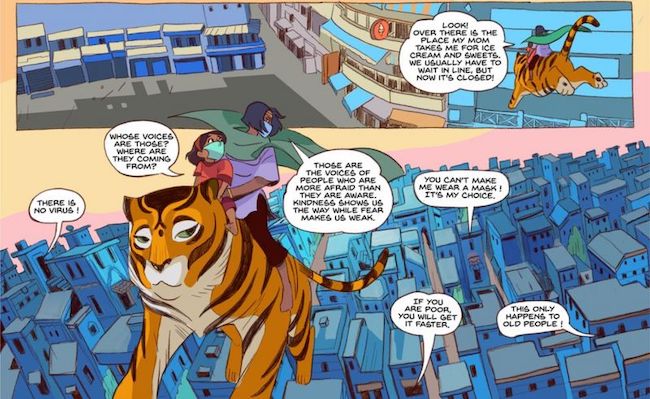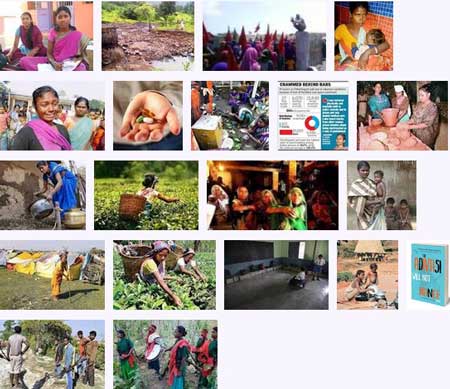At a time when the state is red-faced about rural primary schoolchildren clueless in class, Unicef (Jharkhand) has embarked upon a pioneering project of preparing textbooks in tribal and regional languages for children for whom Hindi is as alien a medium of instruction as English. […]
Textbooks include a theme-based pictorial dictionary in tribal and regional languages and a school language-readiness package. Jharkhand’s HRD and welfare department is partnering this project, while experts in universities are sharing tips with Unicef.
“The idea is to make the child, already startled by a new school environment, feel comfortable and receptive to learning,” said Unicef head (Jharkhand) Job Zachariah.
While the pictorial dictionary will visually depict items that children see in everyday life — home, tree, plough, among others — and its corresponding name in the tribal or regional language, the language readiness package will gradually introduce Hindi words to the students. Interestingly, the pictorial dictionary is for class I and the introduction to Hindi is for class II.
“The pictorial dictionary and the school language readiness package will be ready by this April and June,” Unicef education specialist Binay Patnaik said.
So tribal children will first understand what is taught in their own speech, and then, learn a mainstream language.
Around six months ago, Unicef had conducted a survey across Jharkhand to access if tribal and rural children, who don’t speak in Hindi at home or in the village, actually understood what their teacher said in Hindi. […]
This corresponds to the ASER all-India findings and justifies HRD minister Baidyanath Ram’s stress on using tribal and regional languages as the medium of instruction for children.
Five tribal and four regional languages, given official tag by the Arjun Munda government last September, are spoken in the state. They are Santhali, Kurukh, Mundari, Ho, Kharia, Kurumali, Panchpargania, Nagpuri and Khortha.
A rural child in Bundu understands Panchpargania, but his counterpart in Mandar, Lohardaga, Gumla areas will know Kurukh. Thus, nine different copies of a book — say, a pictorial dictionary — are needed to fulfill the needs of students across regions.
Source: “Finally, tribal mother tongues go to school” by SANTOSH K. KIRO, The Telegraph, Calcutta 3 March 2012
Address : http://www.telegraphindia.com/1120303/jsp/jharkhand/story_15205733.jsp
Date Visited: Mon Mar 05 2012 19:57:28 GMT+0100 (CET)
[Bold typeface added above for emphasis]

Learn more about “Priya’s Mask” and related titles on priyashakti.com >>

Indian magazines and web portals >>
“The smart boy or clever girl who is deprived of the opportunity of schooling, or who goes to a school with dismal facilities (not to mention the high incidence of absentee teachers), not only loses the opportunities he or she could have had, but also adds to the massive waste of talent that is a characteristic of the life of our country.” – Nobel Awardee Amartya Sen in The Argumentative Indian (Penguin Books, 2005), p. 344 | Find this and other books published in India >>
Related: Tribal Children’s Right to Education | Childhood | Ekalavya (Eklavya, Eklabya), EMR & Factory schools | Childrens rights: UNICEF India >>
See also
Chotanagpur | Chota Nagpur | Fact checking
Communities: Asur | Ho| Kharia | Munda | Oraon | Santal | State wise ST list (Scheduled Tribes)
Hul (Santal rebellion 1855-1856) | Tribal freedom fighters
Jharkhand | Jharkhand land rights
Video | Banam: Lutes and fiddles of the Santal people – Jharkhand and West Bengal
Video | Hul Sengel: The Spirit of the Santal Revolution (1855) – Jharkhand
See also
Adivasi Academy & Museum of Adivasi Voice at Tejgadh | Lecture “A View of Higher Education in India”
Appropriate education for Adivasi children – the Vidyodaya School model at Gudalur
Childhood | Children’s books | Childrens rights: UNICEF India | Safe search
People’s Linguistic Survey of India | Volumes (PLSI) | PeoplesLinguisticSurvey.org
Multi-lingual education | Residential school | Ekalavya
Multilingual education is a pillar of intergenerational learning – Unesco
Santali education | Teaching Santal children by Boro Baski
Unesco | Unicef | Unicef India | United Nations
United Nations International Days and Weeks
Video | “Nations don’t make us human – languages make us human”: Ganesh Devy
Women | Safe search | President Droupadi Murmu on women’s empowerment